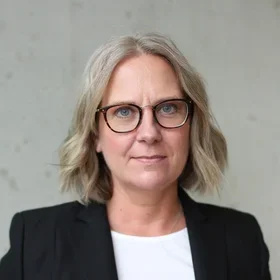Aizita Magaña (’22SPS) committed her life to health care. From volunteering to getting a master’s in public health from the University of Michigan and in her current role as director of Planning and Public Partnership for the Vaccine Preventable Disease Control Program in the Los Angeles County Department of Public Health she experienced many aspects of the sector. Today she focuses on the cultural, political, and socioeconomic factors, among others, that determine how individuals and communities are cared for. Magaña says her perpetual curiosity led her to exactly what she was looking for—Columbia University’s Narrative Medicine program.
In an interview with SPS, she shared experiences from her 20-year career, including working in public health during the COVID-19 pandemic, the future of health care, and her advice to future Narrative Medicine students.
What inspired you to pursue a career in public health?
Right after I graduated from college, I worked at a health clinic for women, volunteered
as a birth coach, and became an HIV testing counselor. Through this work, I realized that the health and well-being of a person extends far beyond their own physical health and actually depends on many nonmedical circumstances including economics, the environment, systems of community support, politics, education, and others—factors commonly referred to now as the social determinants of health. I pursued a career in public health to implement strategies that address these factors in health care.
Tell us about your experience at Columbia. How has it impacted your career and outlook?
I learned the principles of narrative medicine and witnessed the power of putting those into practice. As we say in narrative medicine, it’s not therapy, but it’s incredibly therapeutic. I try to conduct my work now via the core tenets I learned: self-awareness, close reading, and active listening. The practice of bringing attention to my own implicit bias has also been key.
Another wonderful benefit of the program is that I now have a remarkable and supportive community of narrative medicine colleagues that extends across the world.
What are some of your proudest accomplishments?
During the pandemic, I was part of creating rapid response support for communities in which that support otherwise might not have been implemented. I proudly promoted an approach to increase communities’ confidence in vaccines that leads with respect, empathy, and listening. The decision to get vaccinated can require trust and encouragement as much as, if not more than, data and facts.
What do you see for the future of narrative medicine?
I would like to make the ability to learn the practice of narrative medicine more accessible to not only people with lower incomes and people of color, but also to more individuals in the professional world. I am exploring ways to incorporate the practice into my own field of public health and was part of a team that held the first narrative medicine event in Los Angeles earlier this year.
And the future of public health?
Issues of globalization, food scarcity, climate change, violence, racism, immigration, and commercialization of health care all need to be part of the mission. This includes the promotion of health care in certain communities, protection from and prevention of disease, and focusing on meeting necessities including clean air and water, housing, safe workplaces, living wages, public space for recreation, quality education, healthy food, and proper resources for substance-abuse and mental health support. Clearly, the scope and scale of what is needed is daunting, but it’s a worthy goal.
Communities are the allies that make health possible, and as part of health care they need justice, equity, and belonging. Narrative medicine works to remove space between a professional “us” and a community “them,” promotes collaboration, and reduces risk of professional burnout.
I believe that narrative medicine can significantly enhance the growing scope of the work public health is doing to address the impacts of globalization, climate change, violence, and racism on health.
What advice would you give to someone who is considering studying narrative medicine at Columbia?
There is an almost limitless application of the skills you will acquire. Narrative medicine is relevant to more disciplines than one might initially think. Ultimately, you interweave narrative medicine with your current profession, practice, or service work. It’s not about doing more work, but advancing and improving your work with new strategies, which, as a result, increases your own work and life satisfaction.
Narrative medicine can only evolve and advance through new, diverse practitioners and voices, so we need and welcome you!
About the Program
Columbia University’s Master of Science in Narrative Medicine prepares health professionals, writers, and scholars to apply the skills and values of narrative understanding to improve outcomes for both patients and caregivers. It offers a rigorous and in-depth study of close reading of creative texts, illness and disability narratives, narrative ethics, philosophy, creative writing, and other perspectives.


